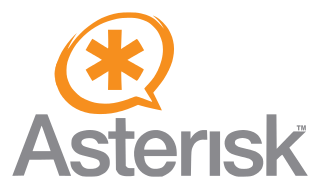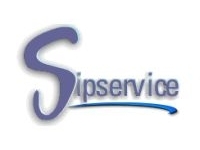The Session Initiation Protocol (SIP) is a signaling protocol used for initiating, maintaining, and terminating communication sessions that include voice, video and messaging applications. SIP is used in Internet telephony, in private IP telephone systems, as well as mobile phone calling over LTE (VoLTE).
Voice over Internet Protocol (VoIP), also called IP telephony, is a method and group of technologies for voice calls for the delivery of voice communication sessions over Internet Protocol (IP) networks, such as the Internet.
Vonage Holdings Corp. is an American cloud communications provider operating as a subsidiary of Ericsson. Headquartered in Holmdel Township, New Jersey, the organization was founded in 1998 as Min-X as a provider of residential telecommunications services based on voice over Internet Protocol (VoIP). In 2001, the organization changed its name to Vonage.

Asterisk is a software implementation of a private branch exchange (PBX). In conjunction with suitable telephony hardware interfaces and network applications, Asterisk is used to establish and control telephone calls between telecommunication endpoints such as customary telephone sets, destinations on the public switched telephone network (PSTN) and devices or services on voice over Internet Protocol (VoIP) networks. Its name comes from the asterisk (*) symbol for a signal used in dual-tone multi-frequency (DTMF) dialing.

A business telephone system is a telephone system typically used in business environments, encompassing the range of technology from the key telephone system (KTS) to the private branch exchange (PBX).
An Internet telephony service provider (ITSP) offers digital telecommunications services based on Voice over Internet Protocol (VoIP) that are provisioned via the Internet.
Direct inward dialing (DID), also called direct dial-in (DDI) in Europe and Oceania, is a telecommunication service offered by telephone companies to subscribers who operate private branch exchange (PBX) systems. The feature provides service for multiple telephone numbers over one or more analog or digital physical circuits to the PBX, and transmits the dialed telephone number to the PBX so that a PBX extension is directly accessible for an outside caller, possibly by-passing an auto-attendant.

A VoIP phone or IP phone uses voice over IP technologies for placing and transmitting telephone calls over an IP network, such as the Internet. This is in contrast to a standard phone which uses the traditional public switched telephone network (PSTN).
Gizmo5 was a voice over IP communications network and a proprietary freeware soft phone for that network. On November 12, 2009, Google announced that it had acquired Gizmo5. On March 4, 2011, Google announced that the service would be discontinued as of April 3, 2011.
Sipgate, stylised as sipgate, is a European VoIP and mobile telephony operator.

Caller ID spoofing is a spoofing attack which causes the telephone network's Caller ID to indicate to the receiver of a call that the originator of the call is a station other than the true originating station. This can lead to a display showing a phone number different from that of the telephone from which the call was placed.
Mobile VoIP or simply mVoIP is an extension of mobility to a voice over IP network. Two types of communication are generally supported: cordless telephones using DECT or PCS protocols for short range or campus communications where all base stations are linked into the same LAN, and wider area communications using 3G or 4G protocols.

Google Voice is a telephone service that provides a U.S. phone number to Google Account customers in the U.S. and Google Workspace customers in Canada, Denmark, France, the Netherlands, Portugal, Spain, Sweden, Switzerland, the United Kingdom and the contiguous United States. It is used for call forwarding and voicemail services, voice and text messaging, as well as U.S. and international calls. Calls are forwarded to the phone number that each user must configure in the account web portal. Users can answer and receive calls on any of the phones configured to ring in the web portal. While answering a call, the user can switch between the configured phones. Subscribers in the United States can make outgoing calls to domestic and international destinations. The service is configured and maintained by users in a web-based application, similar in style to Google's email service Gmail, or Android and iOS applications on smartphones or tablets.

Deltathree Inc. is an American company engaged in the business of voice over IP telephony services. The company was one of the first in the world to offer a telephony service over the internet, reducing the cost of international calls by over 90 percent.
Cloud communications are Internet-based voice and data communications where telecommunications applications, switching and storage are hosted by a third-party outside of the organization using them, and they are accessed over the public Internet. Cloud services is a broad term, referring primarily to data-center-hosted services that are run and accessed over an Internet infrastructure. Until recently, these services have been data-centric, but with the evolution of VoIP, voice has become part of the cloud phenomenon. Cloud telephony refers specifically to voice services and more specifically the replacement of conventional business telephone equipment, such as a private branch exchange (PBX), with third-party VoIP service.
Broadvox is a VoIP service provider for business telecommunications. It offers voice and data network solutions for telecommunications, cable, and wireless carriers, as well as ISPs, ITSPs, Over-the-top (OTT) service providers, MVNOs, and various other business partners. Broadvox operates its own nationwide competitive local exchange carrier (CLEC) facilities.
SIP trunking is a voice over Internet Protocol (VoIP) technology and streaming media service based on the Session Initiation Protocol (SIP) by which Internet telephony service providers (ITSPs) deliver telephone services and unified communications to customers equipped with SIP-based private branch exchange (IP-PBX) and unified communications facilities. Most unified communications applications provide voice, video, and other streaming media applications such as desktop sharing, web conferencing, and shared whiteboard.
SunComm Technology is a Taiwan multinational computer technology and GSM Voice over IP gateway manufacturer. The main products in 2010 focused on GSM VoIP gateways & IP surveillance camera devices. Core members have been engaging in the communication & networks industry since 1977.

Phone Power is an American privately owned commercial voice over IP (VoIP) company, based in Winnetka, California that provides telephone service over the Internet via a broadband connection.
STIR/SHAKEN, or SHAKEN/STIR, is a suite of protocols and procedures intended to combat caller ID spoofing on public telephone networks. Caller ID spoofing is used by robocallers to mask their identity or to make it appear the call is from a legitimate source, often a nearby phone number with the same area code and exchange, or from well-known agencies like the Internal Revenue Service or Ontario Provincial Police. This sort of spoofing is common for calls originating from voice-over-IP (VoIP) systems, which can be located anywhere in the world.






